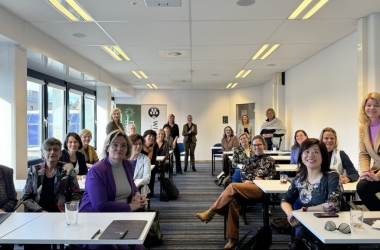-
-
2023 | 2024 - Education and Examination Guides - All Programmes
-
This glossary contains an overview of some of the terminologies, definitions and abbreviations used at Wittenborg University of Applied Sciences.
Wittenborg Online News!
Wittenborg's Globalisation Conference: Navigating Global Trade and Economics
Wittenborg's Globalisation Conference: Navigating Global Trade and Economics

Dr Muhammad Ashfaq Discusses Challenges and Opportunities in Global Trade
In today's interconnected world, global trade is essential for shaping economies worldwide. Recent studies have shown that every major region heavily relies on imports for essential resources and goods. However, amidst concerns about the security of sensitive technologies and resilient supply chains, we are witnessing ongoing shifts in global trade patterns, with more changes on the horizon. Understanding these shifts is crucial for businesses to navigate potential impacts on their operations.
That is why Wittenborg is excited to promote Theme 2 of Wittenborg’s Globalisation Conference, Global Trade and Economics: The Changing Landscape of International Commerce. Set to take place from 14 to 16 August in Apeldoorn, Wittenborg would like to invite researchers to submit their intellectual contributions and explore different aspects of global trade.
Dr Muhammad Ashfaq, Associate Professor at Wittenborg, underscores the importance of this theme. "Global Trade and Economics is a vital topic for the globalisation conference, particularly in our current, unprecedented world."
He explains that economies are still bouncing back from the COVID-19 pandemic. Meanwhile, conflicts are brewing in different parts of the world, like the tensions between Russia and Ukraine and unrest in the Middle East.
Ashfaq highlights the challenges stemming from geopolitical conflicts and supply chain pressures. "Countries are locked in geopolitical situations and geo-economics," he explains. "Supply chain demands are increasing and putting pressure on countries and consumers. Raw materials and finished goods from countries like China and India are becoming more expensive for consumers."
Ashfaq also says that there are also growing uncertainties over the trade war between China and the United States. He references the US government's rollout of extensive restrictions on China’s access to advanced semiconductors and the equipment used to make them. The restrictions require a hard to get licence for the sale of advanced semiconductors to entities within China, largely depriving the country of the computing power it needs to train artificial intelligence (AI) at scale.
In the name of protectionism, an economic policy that restricts imports from other countries through tariffs, import quotas, and various government regulations, Ashfaq explains that many European countries also banned the export of semiconductors and other technologies.
"They are not in favour of giving these technologies to the developing world or rival economies like China. They think that China is taking over from a manufacturing point of view."
Rising interest rates are also hurting economies worldwide. "Interest rates in Europe and other Western countries have been rising. Most European countries and their economies are growing very slowly. For example, Germany is in a recession due to the energy war. So, it is very important to explore how countries can build new alliances, set up new supply chains and new production facilities as many are decoupling from supply chain risks from China."
Ashfaq emphasises sustainability in global trade, particularly in light of climate change concerns. "Climate change is a critical issue," he states. "Implementing sustainable solutions requires significant investment, but it's essential for the future of global trade."
In Europe, energy costs are a significant concern, impacting overall production competitiveness. Ashfaq also highlights the importance of innovation in areas such as electric vehicles and clear strategic thinking in navigating economic uncertainties.
He believes that the Globalisation Conference provides an important platform to address these themes in detail. "We are at a critical juncture of our history," he says. "New suggestions and business models should be developed to navigate the economy more sustainably."
Ashfaq says that any one of these sub-themes will be interesting to explore to see how new business models are involved. "In business economics, the most important thing is to minimise uncertainty. There are so many geopolitical risks that are unfolding that can have an impact on other countries. We are still facing the repercussions of the pandemic while high interest rates are impacting consumers, evident in the housing crisis in the Netherlands, for example. New suggestions and business models should be developed in this case and answer pressing questions such as: How do we navigate the economy more sustainably?"
WUP 01/05/2024
by Erene Roux
©WUAS Press
711 words
Wittenborg CEO Shares Her Ultimate Networking Guide
Wittenborg CEO Shares Her Ultimate Networking Guide
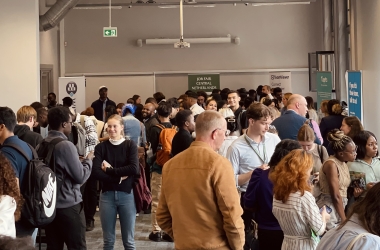
Maggie Feng Shares Her Most Effective Networking Strategies
Wittenborg CEO Maggie Feng compares her networking strategy to attending a distant friend's wedding. While you might know the bride, you don't necessarily know the groom or any of their other friends and relatives in attendance. So, instead of idly wondering or scrolling through your phone, it is best to network and start making connections.
Networking events often resemble this scenario, where you may not know anyone initially. That is why she is sharing her ultimate guide to help Wittenborg students, staff, or anyone for that matter, to network effectively and make meaningful connections.
Preparation is key
Feng says that the first step is always to prepare accordingly.
"If you are attending a networking event, the first step is to Google and find the correct location."
Even more importantly, you should Google and research the main speakers or hosts of the event.
"Search for them on LinkedIn and reach out. Whether you know them or not, send a message. You can always say something like, 'I'm looking forward to seeing you at this or that event'. If you don't reach out, that is your loss. Be blunt and strong in terms of reaching out."
Feng says that the second step is to prepare.
Describe yourself in five sentences
"Put together five sentences to describe yourself. It is important to mention, for instance, where you come from, your study focus, your background, and if you have any work experience. You want to sell yourself and make yourself unique."
Feng says that it is important to mention these five sentences before announcing what your job status is.
What might help is to practise in front of the mirror, according to Feng.
"Even record yourself or ask other friends to listen to your five sentences because you only have one shot at making a good first impression."
Another important factor is to enunciate.
"You need to ensure clarity in your communication. Speaking too softly, especially in noisy environments, can be a problem. Your audience shouldn't struggle to hear you or ask you to repeat yourself."
Focus on numbers
Feng says that people remember numbers. People often meet a lot of new faces at a networking event, so numbers are a great way to stand out.
"For instance, mention something like, 'I have three years of experience at KPMG'. Numbers have a memorable impact on people."
Your appearance matters
Your appearance is very important during networking events.
"See if you can find photos of previous events to see how people dressed," she advises.
Feng brings this back to her distant friend's wedding metaphor, saying that if you feature in photos at a wedding, you want to stand out. It is best to avoid black and navy in this case.
This applies not only to your clothing but also to your overall appearance. "You need to look neat. Make sure your body odour is in check and avoid wearing strong cologne or perfume."
The art of the handshake
How do you make contact with someone? With a firm handshake, of course.
Feng emphasises that the first impression is all about the handshake. When you approach someone, smile, extend your hand and shake firmly.
"If your hand is cold, it's common in the Netherlands to apologise. You can say, 'I've just come in from outside, apologies for my cold hands'. Aim for a handshake that's neither too long nor too short. Practise this with your family and friends!"
And make sure to always introduce yourself with your full name. Networking at Wittenborg's upcoming job fair in Apeldoorn, for instance, networking might resemble the following: "After introductions, you can enquire whether they are seeking any English-speaking talent, if that is your goal. You can then express how your background aligns with their current vacancies and ask about the application process."
Feng suggests asking questions such as: Are positions typically posted on your website, or should I contact your HR department directly? Are you open to hiring internationally? Based on my knowledge, graduates from Dutch universities often have a higher success rate. Do you have experience hiring individuals from abroad? Could you also share what your company excels in, and how many people are currently employed there?
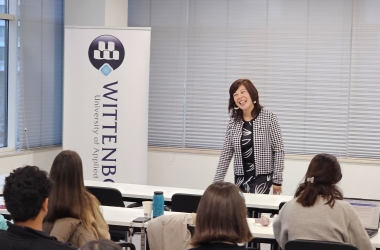
Ending the conversation
The next step is to know how to politely end the conversation.
"Keep some documentation handy that you'd like to share, or politely ask for a business card. You could simply say, 'Thank you very much for all of this information. Is it possible to receive your business card or exchange cards?' Additionally, you may ask, 'Can I find you on LinkedIn?' LinkedIn often offers a QR code feature that allows for easy contact sharing and connection."
When there is a queue
If the situation comes up where you have to wait in a queue, as is the case during most job fairs or even book-signing events, wait patiently and listen.
"If you can't engage in a conversation, try to participate if possible because networking events are not meant for a private one-on-one environment anyway. Showing interest and being proactive is important in such situations. The worst behaviour, I'd say, is when individuals simply stand there like a plant, showing no interest and constantly on their phones."
Other notes
Feng says that networking is like riding a bicycle in the Netherlands: you need to do it at some point or another.
"You don't have anything to lose; you are not at a job interview or making a €10 million deal. You are simply meeting people and making connections."
Feng also shares some important titbits, saying that networking events are not a place to catch up with your friends.
"Also, if you can, drink out of a wine glass. See if the snacks are appropriate to eat. Sometimes you have to hold them in your hand. If there are plates, even better. Otherwise, eat beforehand. It is not great to meet new people with food in your mouth.
"And most importantly, if you are the host of the event, make sure to introduce yourself to others and make them feel welcome."
WUP 30/04/2024
by Erene Roux
©WUAS Press
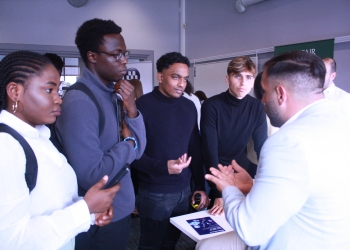
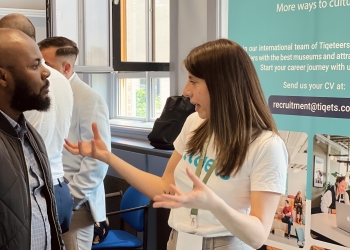
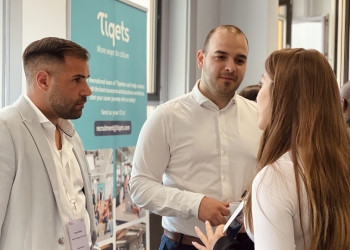
1047 words
Diane Freiberger Leads Open Seminar on Quality in Higher Education
Diane Freiberger Leads Open Seminar on Quality in Higher Education
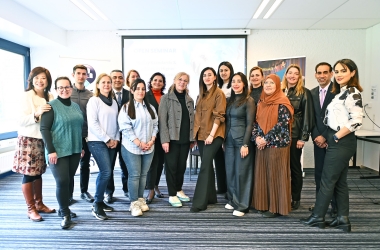
Wittenborg Hosts Open Seminar on Higher Education Quality Standards
On 16 April, Wittenborg hosted an open seminar titled 'Quality Standards and Practices in Higher Education from a European Perspective', which included a special keynote address by Diane Freiberger, Managing Director of the Swiss-German Accreditation Agency FIBAA (Foundation for International Business Administration Accreditation).
Freiberger had previously visited Wittenborg to present the business school with the prestigious FIBAA Premium Quality Seal for its Master of Science – MBM (Master of Business Management) programme.
The particular seminar formed part of the IQAinAR consortium's week-long visit to Wittenborg, with speakers from Spain, Azerbaijan and Wittenborg, fostering a diverse range of perspectives and valuable networking opportunities. Some of the participants included representatives from Azerbaijan State Pedagogical University, Azerbaijan Technical University, Universidad Catolica San Antonio de Murcia, Education Quality Assurance Agency Nakhchivan State University and 456 International BV, all of whom enriched the discussion with their insights.
About FIBAA
In her address, Freiberger shed light on FIBAA's rich history and its pivotal role in shaping international higher education standards since its inception in 1994. Emphasising the organisation's reach, she underscored its operational presence across Europe, Central and Southeast Asia, and the Middle East. Moreover, she highlighted FIBAA's diverse portfolio, which includes programme accreditation, institutional accreditation and advanced education services.
Freiberger pointed out the significance of FIBAA's quality seals, saying, "What is special and unique about FIBAA? When you fulfil your standards, then you get the FIBAA quality seal. But, when you exceed these standards, you get the FIBAA premium skill seal." This commitment to excellence is exemplified by a selection process, with only five to seven procedures out of 140 earning the prestigious premium seal annually.
Another unique feature of FIBAA includes one of its latest certifications 'Excellence in Digital Education', as an innovative tool to assess and ensure the quality of digital learning. She further highlighted FIBAA's intensified efforts in internationalisation and digitalisation, signalling a strategic move towards addressing contemporary challenges in higher education.
Kriszta Kaspers, Head of Education Development and Quality Management at Wittenborg, highlighted that Internal Quality Assurance (IQA) goes beyond being a regulatory requirement; it serves as a catalyst for institutional improvement in higher education.
"By embedding a culture of quality within our universities," she emphasised, "we encourage continuous self-evaluation and adaptation, ensuring that our educational offerings remain relevant in a rapidly changing world." This inclusive approach engages everyone, from faculty and staff to students themselves, fostering an environment where innovative teaching methods and enhanced learning outcomes can flourish.
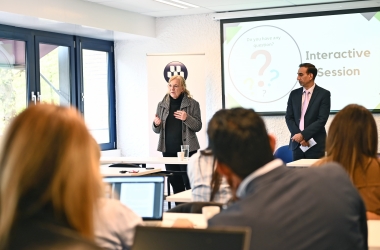
Quality matters: strengthening higher education through accreditation
Head of the School of Business at Wittenborg, Rauf Abdul, also said that accreditation agencies play a crucial role in maintaining the quality of higher education.
"A robust quality assurance system is vital for Higher Education Institutions (HEIs) to meet the needs of key stakeholders, such as students, teachers, employers, and the broader community. It ensures that HEIs deliver excellent education and conduct impactful research, thereby creating a positive societal impact."
Abdul explained that Freiberger overall emphasised the role of accreditation agencies in promoting quality assurance for HEIs to fulfil their mission and contribute to the betterment of society.
"Wittenborg is committed to fostering a culture of quality. The institution has implemented a Plan-Do-Check-Act (PDCA) system to maintain high standards in teaching quality, research, and student engagement."
WUP 26/04/2024
by Erene Roux
©WUAS Press
578 words
Adventure Meets Education: Apply Now for Wittenborg's 2024 Summer School Programme
Adventure Meets Education: Apply Now for Wittenborg's 2024 Summer School Programme
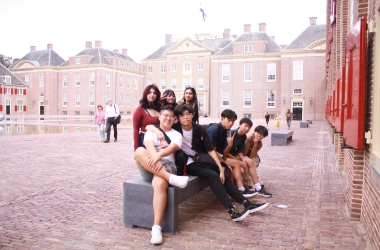
Explore Wittenborg's Summer School Programme in Apeldoorn
Looking to make the most of your summer? Explore the exciting opportunities offered by Wittenborg's Summer School programme for 2024, where adventure meets education.
Designed to help students learn and improve their academic and English skills, this programme also allows ample time to explore the Netherlands over two weeks while staying at Wittenborg's new studio apartments in the vibrant city of Apeldoorn.
"University or high school students mostly seek a programme focusing on specific topics and insights," explains Iryna Bernatska, Wittenborg's Corporate Relations Manager. "Throughout these programmes, participants will work in groups, honing skills such as discussion, debate, negotiation and presentation."
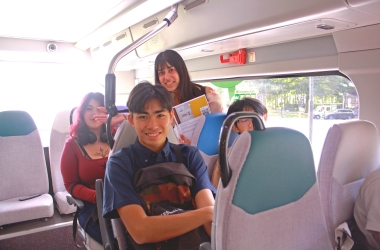
Programme Intakes and Topics
Wittenborg's Summer School has two intakes, each dedicated to different topics. Programme 1, running from 14 July to 26 July 2024, will focus on Intercultural Communications & Leadership, offering valuable insights into effective communication strategies and global leadership techniques.
Programme 2, from 28 July to 9 August 2024, will shift the spotlight to Marketing & Personal Branding, exploring digital marketing trends and strategies.
Both programmes feature classes held Monday to Friday, from 9:00 to 14:00, with coffee and lunch breaks to allow for networking and socialising.
"The programmes are beneficial for those considering studying these subjects or exploring the country," adds Iryna Bernatska. "Social and cultural activities may include a visit to Palace Het Loo, Coda Museum, a countryside steam train trip or a charity cooking event at Maria's Church in Apeldoorn."
Student Spotlight
In 2023, Upinderjeet Kaur, a student from Apeldoorn currently pursuing a degree in HBA (Hospitality Business Administration) at Wittenborg, joined the programme to interact with people from countries all over the world. "I’m studying Tourism at Wittenborg and this was a great opportunity for me to interact with more people," Kaur shares. "The programme also seemed very fun and interesting."
Kaur's experience wasn't just about learning, however, it was also about personal growth. "I improved my communication skills greatly. I participated in different workshops which expanded my knowledge in different areas such as history, presentation skills, creative arts and designs," she reflects.
Kaur says that her favourite part of the entire Summer School experience was getting to know the fellow participants and the trip to Paleis Het Loo. "I definitely recommend the programme to other students. It is a mix of knowledge and fun."
Entry Requirements
If you are interested in the programme, prospective participants are required to submit certain documents through the online application form (linked below). These include a registration or matriculation letter from their current school or university, a high school transcript reflecting a minimum English grade of 6.0, and a copy of the passport data page.
Additionally, applicants must provide a self-introduction letter of up to 300 words, outlining their background and interest in the Summer School programme. For students under 18 years old, a parent consent form will also be necessary.
It is essential to note that the registration deadline for non-visa-required students is four weeks before the programme start date.
Tuition Fees
Each programme, priced at €1,750, includes accommodation at Wittenborg's studio apartments in Apeldoorn, featuring private kitchens and bathrooms. These apartments with their convenient location also offer easy access to city facilities and nearby train stations for wider exploration.
Bernatska notes that after the programme, participants will be awarded a certificate for their achievements, followed by a farewell party. She emphasises that this programme not only enhances one's academic and professional career but also guarantees an unforgettable life experience, nurturing new friendships with fellow students from around the globe within one classroom.
Interested in Wittenborg's Summer School programme? Make sure to apply online through our convenient online application form or request more information here.
WUP 24/04/2024
by Erene Roux
©WUAS Press
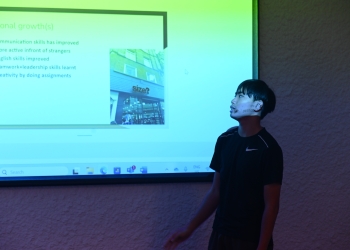
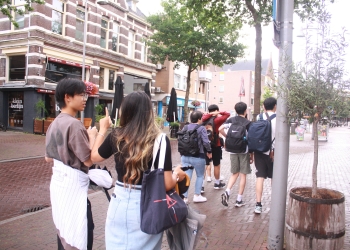
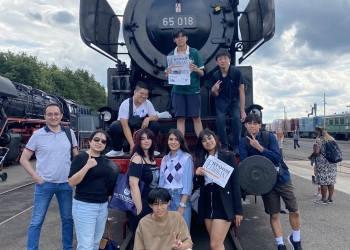
644 words
OECD Countries Receive Record-High Number of 2 Million Students
OECD Countries Receive Record-High Number of 2 Million Students

Peter Birdsall comments on what drives students to move and implications of internationalisation
The number of international students moving to countries that are part of the Organisation for Economic Cooperation and Development (OECD) hit a record-high of 2 million in 2022, in around half of the organisation’s 38 member states.
The data is contained in a study recently released by the OECD and reported by The Pie News. In addition to being the largest figure in history, this represents a 24% increase in the number of students moving to OECD countries since 2019.
For the fourth consecutive year, the United Kingdom was the top receiving country of new international students out of all OECD countries, ahead of the United States. Canada, Australia and Japan complete the list of the top five receiving countries.
In total, the USA currently hosts almost 20% of all international students in the OECD, followed by the UK (14%) and Australia (9%). Outside of English-speaking countries, Germany and France are the primary destination countries, jointly hosting around 15% of all international students.
The news comes as many OECD countries attempt to tackle widespread skills shortages and the challenges related to ageing populations. At the same time, overall migration to richer countries has reached record levels.
According to the president of Wittenborg, Peter Birdsall, the reasons why people decide to study abroad are very diverse, and also depend on where they come from. “What motivates people to migrate for study is often this drive to improve their lives. And maybe a secondary drive for a particular group of students is not only to improve their lives, but also to work in a field that they want to work in. Sometimes, they can’t find opportunities in their countries, especially for people who want to work in cutting-edge areas such as engineering, IT or healthcare.”
In Birdsall’s view, the most important question is how many of these students are going back to their home countries to improve life there. He points out that this depends a lot on the countries these students are from, because some places provide more opportunities than others.
“It is also connected to people’s personal circumstances and backgrounds. Some of them would like to stay abroad in order to send money to their families back home. Others would like to get five to ten years of experience abroad before going back home and being in a much better career position. Students from countries like China, Malaysia and Vietnam, which are thriving, are much more likely to go home again after graduation because they have great opportunities there.”
Birdsall comments that, despite comprising a record number, the 2 million international students who moved to OECD countries represent a small fraction of people who immigrate globally. “A study by the UN Refugee Agency showcases that at mid-2023 there were 36.4 million refugees and 62.5 million people internally displaced due to conflict and violence. That puts the 2 million students into perspective; yet, they have become the scapegoats of conservative, anti-immigration governments because they are the easiest group to target.”
The president of Wittenborg emphasises the need for more macro-level studies delving into these students' motivation to move to OECD countries, how it develops and what the outcome is.
“We’re in a situation where every country is looking at the impact on its own economy, but what is the global impact and what are we going to see in the future? How are we going to move forward from this, especially as a lot of countries are starting to look very inwardly and becoming very conservative? Nowadays, it goes without saying that all countries are interconnected, which includes aspects such as their problems, economies and societies.”
Birdsall mentions that some of the main reasons for attracting international students are to enhance the whole economy and to make higher education a mirror of the real world, especially in a country like the Netherlands. “In the United States, it may be a different story; in the Netherlands, however, we don't do business on a national scale, but rather on a global scale. Our economy is 100% dependent on the international and global economy. So, your higher education should reflect the world that you are in.”
He concludes by affirming that education-related institutions in the Netherlands need to highlight the importance of the internationalisation of education to the government. “We live in a globally connected world, and internationalisation is crucial for this country. It’s almost impossible to envisage any people in OECD countries who are not affected by an international environment.”
WUP 22/04/2024
by Ulisses Sawczuk
©WUAS Press
785 words
EBA Students Spearhead Innovative Solution to LinkedIn Profile Pictures
EBA Students Spearhead Innovative Solution to LinkedIn Profile Pictures
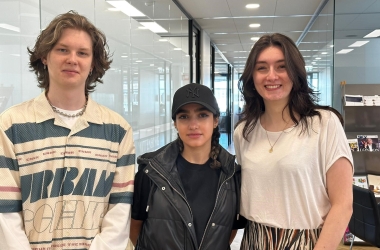
HeadStart aims to enhance students' LinkedIn profiles
In an exciting display of entrepreneurship, a group of EBA (Entrepreneurial Business Administration) students from Wittenborg in Amsterdam has unveiled an innovative startup aimed at addressing a pressing need among their peers: professional LinkedIn profile photos.
Branded as 'HeadStart', the venture offers tailored photography services designed to boost students' presence on LinkedIn and improve their prospects in the job market.
Spearheaded by Wittenborg students, Arsenii Vinnitskii, Leila Keller and Narges Najafi, this new venture emerged as a result of their class projects guided by Senior Lecturer Andreas Ooijer.
When asked about how they came up with the idea, Narges explained that she is a professional photographer. "I have always thought about the fact that I need a new photo for my LinkedIn profile. I also checked the app and saw that most people don't have nice photos. I also have some friends who are in the job market. When they were searching for a job, they always asked me, 'When do you have time to take a picture for my profile?'"
Your LinkedIn profile photo is often the first impression you make on others. Surprisingly, research reveals that 70% of LinkedIn users either have no profile photo or are using one that is sub-par. What's more intriguing is that employers and recruiters spend about 19% of their time on LinkedIn profiles just looking at profile pictures. Narges and the team also noticed that students are not necessarily concerned about having a professional-looking photo for their LinkedIn profiles. And as a student, you don't think about it until you have to apply for a job and realise how competitive the market is.
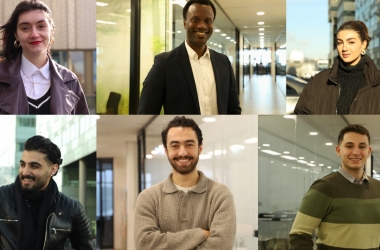
That's where HeadStart comes in. As Leila explains, many photographers in the Netherlands are really expensive, which means that a lot of students cannot afford to pay for these kinds of services. For this reason, they've introduced two packages: The Basic Profile Package of €14, for instance, offers one professional portrait along with essential services such as an intake meeting, posing training, styling and a photo shoot, with the option to add extra services at additional cost.
The Premium Profile Package, at €45, includes five professional portraits, an intake meeting, up to five different poses, styling and a photo shoot, along with guidance on LinkedIn dos and don'ts.
Narges further explains that the first step in the process is talking to their customers to get an idea of what they would like. They also give some instructions on what to wear and how to pose. "They share their expectations and then we take their photos. We take as many as we can, and they decide which one they like the most."
Arsenii adds that another competitive advantage they have is that they try to get the photos to their clients as quickly as possible. "We know that students are busy with work and their studies. We've compared other businesses, whose sessions for one photo can take from 45 minutes to an hour. We wanted to streamline the process, make it faster for our customers, but also maintain a certain touch of personalisation and customer care."
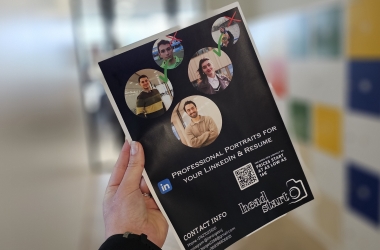
The group believes that they can take this idea far beyond the classroom.
They are now setting their sights on promoting their services at other universities and study associations. They also want to promote it on social media, particularly Instagram.
Arsenii emphasises the importance of first impressions when browsing LinkedIn profiles or CVs, stating, "You spend a lot of time looking at the profile picture when you first visit a LinkedIn profile. Research shows that you need only a fraction of a second to actually make a judgement about a person."
Looking forward, besides promoting photography services, the group is exploring personal branding strategies to help individuals improve their LinkedIn profiles, which is essentially what LinkedIn is all about.
Arsenii adds that their goal is to enhance individuals' online presence, especially for students entering the job market with little work experience. He believes a strong LinkedIn profile offers a significant advantage: "We're trying to maximise their online presence," he continues. "Of course, it will not be the main factor in the decision-making process of hiring someone or not but, for a person who's just starting, particularly students, it is a great boost."
Students interested in their services can reach out via WhatsApp at +98 93 9680 6838, by phone on +31 62 70 23630, or through email at narges2288@gmail.com.
WUP 19/04/2024
by Erene Roux
©WUAS Press
773 words
Join the Debate: Wittenborg’s Globalisation Conference Discusses Global Health
Join the Debate: Wittenborg’s Globalisation Conference Discusses Global Health

Theme Intersects with Healthcare, Geopolitics, Social Issues, Culture, Business and Technology
The COVID-19 pandemic put global health on the spotlight. In addition to causing deep transformations in various sectors, the sanitary crisis also changed how the global population views and addresses health-related matters. However, it is important to highlight that the term 'global health' encompasses much more than the pandemic, which is just an example of a situation related to this field of study.
This broad topic, which has implications on all spheres of life, is Theme 9 of Wittenborg’s Globalisation Conference, set to take place from 14 to 16 August in Apeldoorn. Academics, students, policy-makers and industry professionals are welcome to submit their intellectual contributions and join the debate (see the submission deadlines and guidelines here).
Wittenborg Associate Professor of Applied Sciences Dr Cha-Hsuan Liu points out that all human beings and our living environment are connected nowadays, and in addition to physical health, the global population also faces challenges regarding mental health.
“Besides contagious diseases, the prevalence of chronic diseases such as heart conditions and diabetes is also a global issue. At the same time, when it comes to mental health, we see that global events such as wars and violent attacks affect everyone, and not only the direct victims.”
According to Liu, global health issues are related to socio-political factors such as how healthcare systems are maintained and even to measures concerning local and national infrastructure policies.
“For instance, if a highway is built in front of your house, the intense traffic will impact your daily life. The noise and the CO2 emissions might affect your health and your lifestyle, and even cause illness. The same goes when we are talking about where facilities such as power plants, landfills and water treatment stations will be constructed. They are usually installed in faraway or rural areas, where the disadvantaged segments of the population live. This is a kind of injustice because it places an extra burden on these people. Therefore, global health is also connected to social equality and equity issues.”
Liu underscores that global inequalities and environmental issues including climate change are pivotal in shaping the context of global health.
“The division between the Global North and the Global South also affects global health matters. Developed countries often relocate their factories to developing nations and send their waste to these regions, sometimes compensating them financially. However, developing countries often lack the proper infrastructure to manage these materials, leading to their disposal in rural areas, which in turn affects the health of local communities.”
Liu adds that, during the COVID-19 pandemic, developed countries like the United States and European nations had access to vaccines long before the vast majority of African countries. “The global discrepancies regarding the distribution of vaccines were very clear. The fact is that countries need international political power to have access to drugs, medicines and vaccines. So, many developing countries have started to realise how important it is to engage in international diplomacy and to become part of international organisations in order to have more negotiation power.”
According to the associate professor, cultural and ideological factors also played a significant role in the way countries responded to the pandemic.
“In Asian countries, for example, the governments determined that everyone had to wear masks and the population complied with it, because the majority of the people considered these collective practices as a way of saving lives. In contrast, many individuals in Western countries refused to wear masks or get vaccinated due to prioritising individual freedom over other values. The response to the pandemic was also affected by the political ideologies of the governments in power. Furthermore, responses were influenced by the dissemination of news, information, fake news and conspiracy theories across various media platforms.”
Impacts on business and technology
Liu highlights that researchers can also delve on the significant developments that businesses, the economy and technology have experienced in light of the pandemic and other global health trends.
Among them are the changes to logistics and international mobility. “We now have many small businesses dedicated to logistics, while previously we had to rely solely on major players like DHL to provide these services. Mobility has also changed, with many events, conferences and other activities now taking place online. Because of this, the market of online meeting platforms has boomed. During the pandemic, when there were flight restrictions, people opted for travelling more often on buses and trains. This also raised awareness about sustainability issues; nowadays, in Europe, in-person events often give people vouchers for travelling by train instead of plane tickets.”
Regarding the field of healthcare, the associate professor underlines that people have started caring more about their mental and physical health, engaging more often in activities such as mindfulness practices, yoga and meditation. Additionally, the interest in sports and physical exercise has also increased.
The health tech sector, in turn, has gone through major breakthroughs. One example is the fact that, previously, the pipeline to develop vaccines, medicines and other pharmaceutical products would take from 10 to 20 years. Now, these procedures can take as fast as six months to one year.
“In light of the urgency of the pandemic, people needed to adopt faster processes to mass-produce drugs and vaccines. Several new technologies have been implemented to the processes of R&D (research and development) and production. One example is the organ-on-a-chip, which creates ‘human in vitro models’ for both healthy and diseased organs, offering drug advancements in toxicity screening and also replacing animal testing.”
Liu also comments that the number of international cooperations in the medical care industry is on the rise. She mentions the fact that Pfizer and other players among the world’s biggest pharmaceutical companies developed and patented COVID-19 vaccines but then licensed their intellectual property to different corporations such as BioNTech, from Germany. By doing this, they were able to speed up production and distribution in different parts of the world.
Liu believes that this kind of international cooperation is bound to be increasingly more frequent, highlighting that it is connected to the rise of the intangible economy, which encompasses assets such as patents, brands, trademarks and copyrights.
“If we want to supply certain products on a global scale, then we need to think globally and invest in consortiums involving corporations from different countries or even continents. That is also what happened in Africa, when the World Health Organisation (WHO) took into account the shortage of vaccines and demanded that the big pharma companies issued their patents to certain African countries. This way, the vaccines could be produced and distributed locally and effectively,” she concludes.
WUP 17/04/2024
by Ulisses Sawczuk
©WUAS Press
1138 words
Empowering Women in Leadership: Strategies from SER Topvrouwen 2024
Empowering Women in Leadership: Strategies from SER Topvrouwen 2024
Event Sheds Light on the Path to More Women Becoming Supervisory Board Members
On 18 March, Wittenborg's Brinklaan location hosted the inaugural SER Topvrouwen meeting of 2024, shedding light on women's leadership and the pivotal roles of supervisory board members.
SER Topvrouwen, also known as Top Women Apeldoorn, was co-founded by Wittenborg CEO, Maggie Feng. Comprising women in leadership positions in prominent Dutch institutions and corporations, SER Topvrouwen aims to amplify visibility and accelerate the progression of female talent.
At this exclusive event, approximately 20 women had the opportunity to hear from Jannie Benedictus, a financial journalist, who shared insights on female participation over the past 25 years. Dorothea van Rijnen also discussed the role supervisory board members before the networking session.
Feng noted that Benedictus provided intriguing insights, while Van Rijnen offered practical tips. "Jannie delved into topics such as the gender pay gap, part-time versus full-time work, societal perceptions of female participation, the balance between family, children, and career, as well as the surprising number of women who do not fear for financial dependence on their partners, often full-time working men. However, it is evident that while strides have been made towards gender equality, there is still progress to be made."
Empowering Women: Practical Tips for Becoming a Supervisor
Van Rijnen, a headhunter since the mid-90s, has been associated with Vanderkruijs since 2007 and joined Boer & Croon in 2022. With a focus primarily on public sectors like healthcare and education, she specialises in executive and supervisory roles within these domains.
She covered various supervision-related topics, including definitions, board composition, professionalisation, motivations, requirements, target demographics, pathways, and strategies for success.
Van Rijnen outlined the three main duties of a supervisor, which mainly involve overseeing long-term value creation, acting as an employer, and offering advisory support on strategic matters.
She also emphasised the importance of considering factors such as time availability, regional engagement, and relevant experience, alongside broader attributes such as governance understanding, adaptability and an open, listening demeanor.
So, how does one become a supervisor anyway? According to Van Rijnen, to become a supervisor, individuals can enrol in a modern supervision course, respond to (online) advertisements and network with agencies.
Excelling in the role, however, requires a blend of knowledge, skills, and attitude, including soft skills, a thorough understanding of corporate governance and personal effectiveness.
Additionally, visibility within the organisation and understanding current trends are essential.
She concluded her presentation with a powerful thought: Recent data indicates a positive shift in gender balance within supervisory boards, with 82% now having one-third female commissioners, as of March 2024. However, as van Rijnen suggests, when more women take on supervisor roles, reports like these will no longer be news, marking significant progress towards gender equality in leadership.
WUP 15/04/2024
by Erene Roux
©WUAS Press
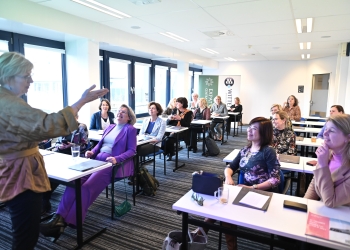
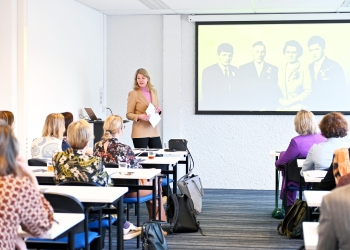
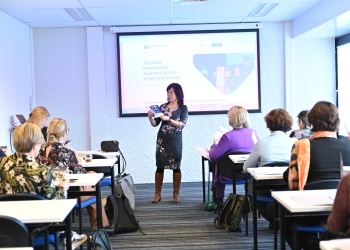
482 words
Wittenborg’s Globalisation Conference: Exploring Education in a Globalised Era
Wittenborg’s Globalisation Conference: Exploring Education in a Globalised Era
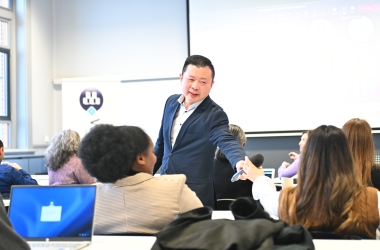
Dadi Chen Explores Recent Changes and Opportunities in Education
As we find ourselves in an era of globalisation, 'Education in a Globalised Era' has been chosen as Theme 10 of Wittenborg’s Globalisation Conference, set to take place from 14 to 16 August in Apeldoorn.
Dadi Chen, Deputy Head of the School of Business, who is also a reviewer during the conference, sheds light on 'Education in a Globalised Era' and 'preparing the next generation for a boundary-less world', noting that this phenomenon is already occurring in many countries. Despite acknowledging that education lags behind other industries, Chen notes significant shifts, particularly seen in the increasing number of students opting to study abroad.
"When people choose to study at an international business school or university, they become more independent, making it easier to adapt to diverse learning and work environments," Chen explains. "International education positively influences individuals, especially in the era of technology like Artificial Intelligence (AI) and other technological advancements."
One pressing question posed by Chen revolves around the evolving role of universities in today's information-rich world. Traditionally perceived as "bastions of knowledge", universities now face challenges posed by platforms like ChatGPT, for instance. Chen prompts us to consider how educational institutions adapt, whether by integrating such platforms or becoming part of them.
According to him, the focus lies on training students to be future professionals who are proficient in using technology yet remain independent thinkers. To navigate these changes, it is also important to update the education system to cater for students from diverse backgrounds and industries. This involves continuous improvement of teaching methods, administrative processes and overall educational infrastructure.
Diving into sub-themes: Curriculum Internationalisation
Researchers exploring the theme 'Education in a Globalised Era' might delve into sub-themes such as leveraging technology for global business education, cultivating cross-cultural leadership, analysing the benefits and challenges of international experience, nurturing innovation in the global business landscape, building collaborative initiatives with global institutions, and instilling universal standards and values in business practices.
To offer more insight into one of the sub-themes called 'Curriculum Internationalisation', Chen says that international business schools and universities should be cautious of assuming their curriculum's automatic internationalisation just because they have international staff and students who often still use textbooks published in the United States and used in Europe, for instance.
"The trend of global communication means everything is mingled. So, if you want to convince people of the quality of your country's learning materials, you must consider their perspective. How do they perceive the value you're offering, considering potential conflicts? If people say, well, the principles that you invented do not apply here in this country, you need to consider that."
He appreciates the term 'boundary-less' because it reflects how modules can now be accessed online from various countries, allowing individuals to gain a global perspective on the knowledge they acquire through education.
Changes in the educational landscape do not stop there though. He says that many of Wittenborg's MBA (Master of Business Administration) students, for example, have work experience in different countries, making them knowledge contributors. "I've noticed that lecturers are more modest than before. Lecturers have started asking students, 'What have you done?' and 'What is your experience?' and 'What would you do if you were in that situation?' It is important to ask the students to be a part of the learning process in this case."
This can also lead to a potential shift away from traditional textbooks, envisioning a classroom environment where real-world examples are sourced globally and openly shared among students. "Lecturers now learn from students," he remarks. "We're in the same classroom, talking about the same thing, wanting to develop together. It's a positive change spurred by internationalisation."
Chen invites researchers to submit papers on these themes for the conference. Ultimately, he underscores the significance of the Globalisation Conference as a platform for researchers to communicate, share and discuss their findings across various topics.
WUP 12/04/2024
by Erene Roux
©WUAS Press
684 words
Wittenborg Hosts Exclusive Book Signing Event for Dr Cara Antoine's 'Make it Personal'
Wittenborg Hosts Exclusive Book Signing Event for Dr Cara Antoine's 'Make it Personal'
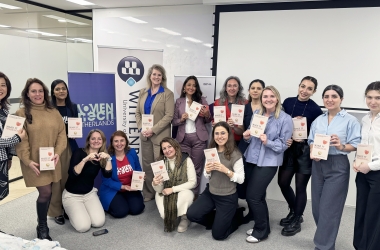
Wittenborg Hosts Book Signing Event in Amsterdam
On 20 March, Dr Cara Antoine, Executive Vice President and Chief Technology, Innovation & Portfolio Officer at Capgemini and board member of the Netherlands Chapter at Women in Tech, presented her Amazon bestseller, 'Make it Personal: Discover the Five Dimensions of Human Collaboration in the Workplace'.
Hosted by Wittenborg at its Amsterdam study location, the event brought together Wittenborg staff, students and members of Women in Tech Netherlands chapter to purchase signed copies of Antoine's book and network.
Introductions
Wittenborg CEO, Maggie Feng, welcomed attendees and provided a brief introduction to the business school. Senior IT Auditor and Women in Tech Youth Ambassador, Reshelle Naidoo then discussed Women in Tech, which aims to empower women and girls in STEM (Science, Technology, Engineering and Mathematics) by 2030. Naidoo highlighted the importance of female representation in technology and finance studies, questioning, "How can we accelerate this change?" She also shared a message from the chapter's director, Lieke Lamb, who thanked Antoine' for her leadership and generosity. "Cara's contributions do not end with leadership alone," Naidoo read. "In a remarkable gesture, she has chosen to donate today's proceeds of her book to Women in Tech."
Antoine then spoke about her book in detail.
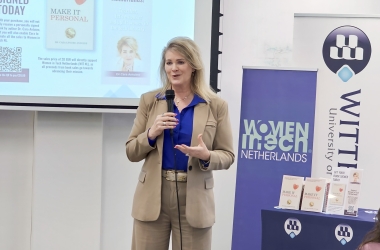
From thesis to bestseller: Dr Cara Antoine's success
The book, which was officially launched in October 2023, took Antoine almost six years to write. Referring to her time at Royal Shell, she said, "Imagine being in a place of work, where you are surrounded by brilliant people, who have great ideas and who really want to make a difference, in a sector which is very important for the world, which is the energy sector. But, at the same time, these brilliant individuals could not figure out how to collaborate or learn how to connect with other people."
Antoine later chose to enter into a DBA (Doctorate in Business Administration) at the University of Bradford School of Management in the United States. When it came time to work on her thesis, she had to identify what she wanted to research. The theme of relationships in the workplace emerged, focusing on how our actions influence positive outcomes in collaboration. "I was so inspired by the environment that I worked in, that I thought this was the place where I could study and do my research and understand the dynamics between people."
Antoine then reached out to individuals in large organisations around the world. She also read around four hundred pieces of literature to procure the theoretical side of her thesis. After doing a thematic analysis, Antoine said that it was interesting to peel back the layers and understand that when it comes to trust in an organisation, for instance, there can be negative and positive connotations. Is the organisation stimulating or hindering our progress because of broken trust, for example? Five themes therefore evolved out of this approach. Her study quickly turned out to be a human study, answering questions such as 'What makes people tick?' and 'What are they motivated by?'
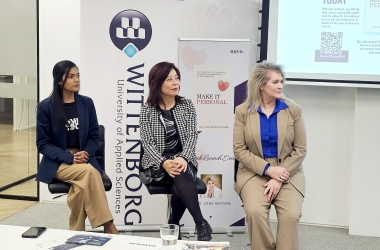
Antoine then shared that she often challenge the traditional HR systems found in most organisations. They tend to focus on weaknesses, telling individuals they excel in only a few areas. Instead, we should prioritise enhancing their strengths. "By amplifying what individuals are already good at, we unlock their full potential. It's not just about excelling in those areas, it's about expanding the possibilities of what they can achieve. This approach yields much more from each individual."
After completing her thesis, Antoine reflected on how she wanted to contribute to organisational knowledge. "The university told me, 'Thanks for this block of a thesis, we are now going to put it on the shelf of a library. And that's it.'"
That's when she got the idea to write a book and conduct workshops, among many other things.
Insights on female leadership
After Antoine discussed her book, Feng and Naidoo joined her for a panel discussion, covering topics such as education, female leadership and generational differences.
When asked about balancing being a woman and a leader in her field, Antoine shared her experiences of being the first in many situations. For example, at 14 years old, she was the only girl in her class among boys. Fortunately, she had a teacher who believed in her. She emphasised the importance of being the first, not for personal achievement, but to pave the way for others and promote inclusivity. "By being the first, you have an opportunity to be a catalyst for change. It is an opportunity to change the representation of what you want to see. It is not about being 'number one'. It is about opening the gateway and involving others."
Drawing inspiration from Antoine's success
Wittenborg MBA (Master of Business Administration) student and business owner from Macedonia, Marija Cvetanovska also attended the event after she saw that Antoine's book was selling really well on Amazon.
"I really got inspired by a woman who combines work and life at the same time," Cvetanovska explained. "That is what I wanted to learn. Tonight, I enjoyed Cara's speech on the ups and downs of life. It puts a personal stamp on it. I really got inspired by that because sometimes I wonder if I took the correct steps in my own studies and my business. Isn't it too challenging? Isn't it too risky? Now I've realised, I'm not the only one [taking risks]."
WUP 10/04/2024
by Erene Roux
©WUAS Press
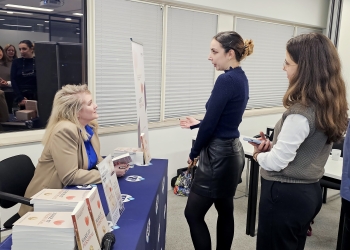
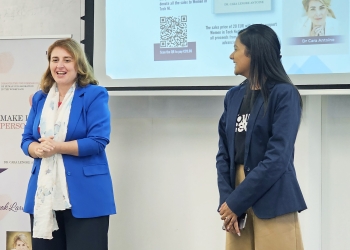
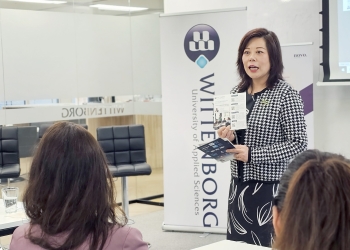
936 words


